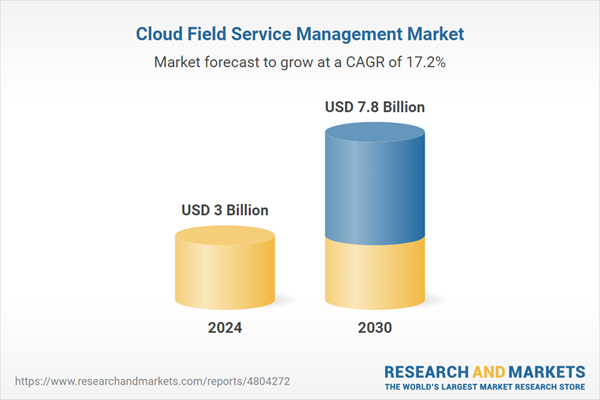Global Cloud Field Service Management Market - Key Trends and Drivers Summarized
How Is Cloud Field Service Management Transforming Service Delivery?
Cloud Field Service Management (FSM) refers to the use of cloud-based software to manage and optimize the operations of a company's field service workforce. Traditionally, field service operations - whether in sectors like utilities, telecommunications, manufacturing, or home services - were managed through paper-based systems or disconnected digital tools, making scheduling, dispatching, and tracking field technicians a complex and inefficient task. Cloud FSM addresses these challenges by offering a centralized, real-time platform that integrates scheduling, work orders, inventory management, customer information, and even analytics. Field technicians can access all the necessary data on their mobile devices, from work orders to customer history, ensuring that they have the right information at the right time to perform their tasks efficiently. Cloud FSM also provides managers with greater visibility into field operations, allowing them to monitor technician locations, manage workloads, and ensure compliance with service-level agreements (SLAs). By streamlining these processes, Cloud FSM significantly improves service delivery, reduces downtime, and enhances the overall customer experience, making it a critical tool for any business reliant on field service operations.How Does Cloud FSM Enhance Efficiency and Productivity?
The core benefit of Cloud FSM lies in its ability to dramatically improve the efficiency and productivity of field operations. One of the most powerful features of these systems is intelligent scheduling and dispatching, which allows businesses to assign the right technician to the right job based on factors like location, skill set, and availability. This not only reduces travel time and operational costs but also minimizes delays in service delivery, leading to higher levels of customer satisfaction. Real-time GPS tracking and geolocation tools further enhance this efficiency by allowing managers to optimize routes, avoid traffic congestion, and make real-time adjustments in response to unforeseen circumstances such as emergencies or cancellations. Additionally, Cloud FSM platforms typically integrate with inventory management systems, enabling technicians to check the availability of parts and tools before arriving at a job site. This eliminates multiple visits due to missing equipment, thereby increasing first-time fix rates. The mobile access provided by Cloud FSM is another key factor that boosts productivity, as technicians can complete and submit job reports, capture customer signatures, and even process payments directly from their mobile devices. This real-time connectivity ensures that data is instantly available to the back office, allowing for quicker invoicing, faster decision-making, and a more responsive service model overall.What Are the Security Challenges and Solutions in Cloud FSM?
Security has always been a concern for businesses considering cloud-based solutions, and Cloud FSM is no exception. Since these platforms handle sensitive customer data, work order details, and potentially even payment information, ensuring the security of this information is paramount. One of the main challenges is the fact that field service operations are, by nature, decentralized. With technicians accessing cloud platforms from various locations and devices, the risk of unauthorized access or data breaches increases. However, Cloud FSM providers have made significant strides in addressing these security issues. Most platforms now offer robust security protocols, including end-to-end encryption, secure authentication methods, and data partitioning to ensure that sensitive information is protected both in transit and at rest. Role-based access control is another essential feature, allowing companies to restrict access to sensitive data based on the user's role within the organization. This ensures that technicians, managers, and administrative staff only see the information that is relevant to their specific functions. Additionally, Cloud FSM platforms typically come with audit trails and activity logs, enabling businesses to monitor user actions and detect any suspicious activity in real-time. For industries with strict regulatory requirements, many FSM solutions also offer compliance features, ensuring that data handling practices align with laws such as GDPR or industry-specific regulations.What Factors Are Driving the Growth of the Cloud FSM Market?
The growth in the Cloud Field Service Management market is driven by several factors that reflect the broader trends in service delivery and business operations. One of the primary drivers is the increasing demand for real-time visibility and operational efficiency in field service operations. As companies face growing pressure to deliver faster, more reliable services, Cloud FSM systems provide the tools necessary to optimize every aspect of field service, from dispatching to inventory management. The rise of the Internet of Things (IoT) is also a significant contributor, as IoT-enabled devices allow for predictive maintenance, where equipment issues can be detected and resolved before they lead to costly failures. Cloud FSM integrates seamlessly with these IoT systems, enabling businesses to automate maintenance schedules and improve asset uptime, which is particularly important for industries like manufacturing and utilities. Another key driver is the growing expectation of customers for faster, more personalized services. Today's consumers demand quick responses and real-time updates, and Cloud FSM enables businesses to meet these expectations through features like real-time technician tracking, automated notifications, and customer portals where they can track the progress of their service requests. Additionally, the shift toward mobile and remote work has accelerated the adoption of Cloud FSM, as businesses need solutions that allow technicians to access data and complete tasks from the field without being tied to an office or centralized system. Technological advancements such as AI and machine learning have also fueled the growth of Cloud FSM. These systems now offer advanced analytics and predictive tools that help businesses forecast demand, allocate resources more efficiently, and even predict equipment failures before they occur. Finally, small and medium-sized enterprises (SMEs) have embraced Cloud FSM as a cost-effective solution that allows them to compete with larger organizations by providing the same level of service efficiency and customer satisfaction. The shift from capital expenditure (CapEx) to operational expenditure (OpEx) models also makes Cloud FSM attractive to businesses of all sizes, as they can access these advanced tools without the need for significant upfront investments. As these trends continue to evolve, the Cloud FSM market is poised for sustained growth, driven by the need for more efficient, data-driven service management.Report Scope
The report analyzes the Cloud Field Service Management market, presented in terms of market value (USD). The analysis covers the key segments and geographic regions outlined below.- Segments: Component (Solutions, Services); Organization Size (Large Enterprises, SMEs); Deployment (Public Cloud, Hybrid Cloud, Private Cloud); End-Use (Retail & Consumer Goods, Manufacturing, Transportation & Logistics, Construction & Real Estate, BFSI, Energy & Utilities, Other End-Uses).
- Geographic Regions/Countries: World; United States; Canada; Japan; China; Europe (France; Germany; Italy; United Kingdom; and Rest of Europe); Asia-Pacific; Rest of World.
Key Insights:
- Market Growth: Understand the significant growth trajectory of the Solutions Component segment, which is expected to reach US$4.1 Billion by 2030 with a CAGR of 14.4%. The Services Component segment is also set to grow at 21% CAGR over the analysis period.
- Regional Analysis: Gain insights into the U.S. market, valued at $809 Million in 2024, and China, forecasted to grow at an impressive 16% CAGR to reach $1.2 Billion by 2030. Discover growth trends in other key regions, including Japan, Canada, Germany, and the Asia-Pacific.
Why You Should Buy This Report:
- Detailed Market Analysis: Access a thorough analysis of the Global Cloud Field Service Management Market, covering all major geographic regions and market segments.
- Competitive Insights: Get an overview of the competitive landscape, including the market presence of major players across different geographies.
- Future Trends and Drivers: Understand the key trends and drivers shaping the future of the Global Cloud Field Service Management Market.
- Actionable Insights: Benefit from actionable insights that can help you identify new revenue opportunities and make strategic business decisions.
Key Questions Answered:
- How is the Global Cloud Field Service Management Market expected to evolve by 2030?
- What are the main drivers and restraints affecting the market?
- Which market segments will grow the most over the forecast period?
- How will market shares for different regions and segments change by 2030?
- Who are the leading players in the market, and what are their prospects?
Report Features:
- Comprehensive Market Data: Independent analysis of annual sales and market forecasts in US$ Million from 2024 to 2030.
- In-Depth Regional Analysis: Detailed insights into key markets, including the U.S., China, Japan, Canada, Europe, Asia-Pacific, Latin America, Middle East, and Africa.
- Company Profiles: Coverage of players such as Acumatica, Inc., Astea International Inc., Clicksoftware, IBM Corporation, IFS Linkoping and more.
- Complimentary Updates: Receive free report updates for one year to keep you informed of the latest market developments.
Some of the 222 companies featured in this Cloud Field Service Management market report include:
- Acumatica, Inc.
- Astea International Inc.
- Clicksoftware
- IBM Corporation
- IFS Linkoping
- Microsoft Corporation
- Oracle Corporation
- Salesforce.com, Inc.
- SAP SE
- Servicemax, Inc.
- ServiceNow, Inc.
- Servicepower Technologies PLC
This edition integrates the latest global trade and economic shifts into comprehensive market analysis. Key updates include:
- Tariff and Trade Impact: Insights into global tariff negotiations across 180+ countries, with analysis of supply chain turbulence, sourcing disruptions, and geographic realignment. Special focus on 2025 as a pivotal year for trade tensions, including updated perspectives on the Trump-era tariffs.
- Adjusted Forecasts and Analytics: Revised global and regional market forecasts through 2030, incorporating tariff effects, economic uncertainty, and structural changes in globalization. Includes historical analysis from 2015 to 2023.
- Strategic Market Dynamics: Evaluation of revised market prospects, regional outlooks, and key economic indicators such as population and urbanization trends.
- Innovation & Technology Trends: Latest developments in product and process innovation, emerging technologies, and key industry drivers shaping the competitive landscape.
- Competitive Intelligence: Updated global market share estimates for 2025, competitive positioning of major players (Strong/Active/Niche/Trivial), and refined focus on leading global brands and core players.
- Expert Insight & Commentary: Strategic analysis from economists, trade experts, and domain specialists to contextualize market shifts and identify emerging opportunities.
Table of Contents
Companies Mentioned (Partial List)
A selection of companies mentioned in this report includes, but is not limited to:
- Acumatica, Inc.
- Astea International Inc.
- Clicksoftware
- IBM Corporation
- IFS Linkoping
- Microsoft Corporation
- Oracle Corporation
- Salesforce.com, Inc.
- SAP SE
- Servicemax, Inc.
- ServiceNow, Inc.
- Servicepower Technologies PLC
Table Information
| Report Attribute | Details |
|---|---|
| No. of Pages | 284 |
| Published | January 2026 |
| Forecast Period | 2024 - 2030 |
| Estimated Market Value ( USD | $ 3 Billion |
| Forecasted Market Value ( USD | $ 7.8 Billion |
| Compound Annual Growth Rate | 17.2% |
| Regions Covered | Global |









